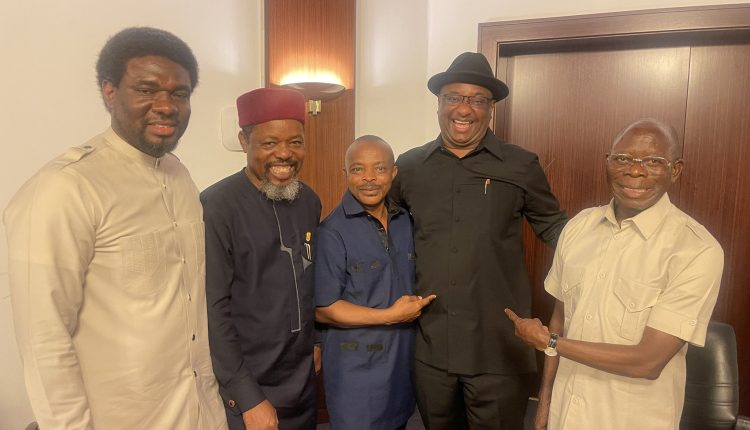A cross-section of artisans, engineers and other Nigerians have accused the organised labour of selling out over the resolutions reached with the federal government on the fuel subsidy removal.
The Nigeria Labour Congress (NLC) and the Trade Union Congress (TUC) on Monday secured “seven key agreements” with the federal government before suspending their planned nationwide strike scheduled to commence today.
Daily Trust reports that the unions were set for their first major national strike in eight years, hours before the workers back-pedalled after reaching an agreement with the government.
This, however, did not go down well with many Nigerians who believed it was unlike NLC and TUC to cave in after they convinced millions of Nigerians that they would act on their behalf.
- Senate presidency: Group faults Ndume over remarks on Yari’s merit
- Kaduna gov’ship: Ashiru, PDP to calI 25 witnesses against Uba Sani
Reading out the communiqué issued at the end of the Monday night meeting with the labour unions, the Speaker House of Representatives, Femi Gbajabiamila, who led the government side, said seven resolutions were reached to address the situation, including that, “The federal government, the TUC and the NLC to establish a joint committee to review the proposal for any wage increase or award and establish a framework and timeline for implementation.
“The federal government, the TUC and the NLC to review the World Bank Financed Cash transfer scheme and propose inclusion of low-income earners in the programme.
“The federal government, the TUC and the NLC to revive the CNG conversion programme earlier agreed with labour centres in 2021 and work out detailed implementation and timing,” among others.
But Nigerians who will not likely benefit from the palliatives proposed at the meeting as they are not civil servants have condemned the labour unions.
Muhammed Yunusa, a fashion designer in Kubwa, Abuja, who uses petrol for his generator to operate industrial machines for sewing, said it had not been easy carrying out his work.
“The petrol we normally get for N220 before is now between N537 and N550 per litre. How can we cope with that? We are just struggling to survive; the money is not there. I am still wondering why the NLC shelved the strike. I plead with the authorities concerned to consider us. Although the decision to remove the subsidy is good, the timing is very wrong,” he said.
Olagunju Deji, a barber, said the cost of living and doing business in Nigeria had gone up with the subsidy removal.
He said, “From the day President (Bola Ahmed) Tinubu made the announcement, there was this wind of suffering that blew away the roof of the average Nigerian and exposed us to more hardship. With this increased petrol price, there will be a rise in the cost of food, a rise in house rents, transportation and school fees.
“The situation is really affecting my business because after increasing my barbing fee, quite a number of customers stopped coming to my shop. The NLC should have embarked on the planned protest.”
A bakery owner, Thomas Ruth, said it was inhuman to remove the subsidy without putting in place palliatives to cushion the effects.
“Businesses like mine depend on electricity. The epileptic power supply and lack of money to buy enough fuel to power generators will ground our business.
“The situation is pathetic. This is very sad and inexcusable for a government that is just coming in. If you don’t get fuel and no electricity, you will stop operation, no money to make and salaries will not be paid. Bread and garri are going to be out of reach with these unnecessary hikes,” Ruth said.
Yusuf Idris said he could no longer take his family’s clothes to the laundry due to the increase in the service fee.
“I pay N400 for a pair of clothes but now they have increased it by 100 per cent, how much am I earning?
Also speaking, a tailor, Ibrahim Na’Allah said, “We used to sew a pair of cloth at the rate of N3,500 but now we can hardly sew that to you at the rate of N5,000. Even the cost of materials we used in sewing the clothes has increased.”
A staff of a hotel in Kano, Martha Musa, said she was surprised that the labour rescinded its decision to embark on a protest.
She said, “We knew all along that the labour was up to something. They met last week, so why delay the strike till Wednesday? This appears to me that the labour has sold out. The resolutions reached did not capture some of us who are not government workers. What is the percentage of those they are seeking wage increase for?”
Malam Musa Ismaila, a civil servant, also accused the labour leaders of insincerity.
“Some states have not implemented the N30, 000 minimum wage, yet the labour leaders are seeking an increase. Who are they fooling? What about traders and other private persons, what do they stand to gain from the resolutions? There is pressure on their earnings already,” he said.
Agbabiaka Taiwo Taoffiqqat, a hairstylist, said, “It is really affecting my business so bad because the power supply isn’t stable so I run a generator most of the time. The fuel price has increased and customers expect me to maintain the normal price for the services, which has made some to stop patronising me.”
MAN fears job loss
Efforts to speak with the Director-General of the Manufacturers Association of Nigeria (MAN), Segun Ajayi-Kadir, proved abortive as of the time of filing this report.
However, a member of the National Council of MAN and the immediate past Chairman of the Kano branch, Sani Hussaini, said the manufacturing sector is threatened by the subsidy removal.
He said, “It has affected everybody, especially those of us that manufacture. Before, we have to put down some machines and go back to using petrol as an alternative. Unfortunately, now that petrol is almost rubbing shoulders with diesel, we are in a serious problem.
“What is disturbing us now is that raw materials are expensive; the cost of production is also expensive but you cannot increase the price of goods. If the goods are not a necessity, you just have to stop the production.
“Secondly, if you look at the staff we are working with, they are also battling the same issue. One that spends N100 to come to work will have to now pay N300 and the same when going back home. We are not even talking about what he will eat at work.
“If you look at his work related expenses alone, it’s enough to bring one down. In the end, he will be working for nothing and you cannot also increase his salary because you have to double it at least. Where will you get the return? It’s not easy; we are not enjoying it at all honestly.”
NATE asks FG to establish digital modular refinery, provide buses
The Chairman of the Nigerian Association of Technologists in Engineering (NATE), Abuja branch, Abraham Agu Okpani, has said the subsidy removal has affected the whole economy including engineers, technologists, and skilled and unskilled labourers.
He expressed concerns that the negative effects of the subsidy removal could hamper the country’s GDP, if not addressed properly.
To proffer a solution to the subsidy removal, Okpani advised the federal government to establish a digital modular refinery in each of the 36 states and take a look at the living wage, not minimum wage, to enable high productivity.
He also said the government should release coastal buses for transportation in all the states, metropolitan cities and rural areas.
“The situation is too bad because the transportation to workplaces of artisans, engineers, craftsmen, technicians and Nigerians at large to their various sites and offices is on 85 per cent increase recently,” he said.
He urged the government to note that a nation without technologists is unproductive.
Make demands on behalf of Nigerians, CSOs slam unions
The Resource Centre for Human Rights and Civic Education (CHRICED) and the Good Governance Team (GGT) has urged the labour unions to make their demands for the generality of Nigerians and not for government workers alone.
The Executive Director of CHRICED, Dr Ibrahim Zikirullahi, said that the organisation had made it clear that Nigerians needed to take their destiny in their own hands, notwithstanding that the labour movement has a critical role to play in the struggle for an equitable, just and prosperous country.
“It will be foolhardy to over rely on the commitment of labour alone. Labour has its own challenges and peculiarities. If the leadership of labour decides it is ok to accept pittance as palliatives, which would not even reach the totality of the population, that is up to them and history will judge.
“In the end, if labour fails to play the role of being the arrowhead of the national resistance against harsh and inhumane policies, the Nigerian people themselves will eventually offer the resistance and pressure needed to birth good governance. After all, a movement as recent as the #EndSARS was not inspired by labour. The youth of Nigeria picked up the gauntlet and they made a resounding impact,” Zikirullahi said.
Also, the Convener, GGT, Mr Tunde Salman, said, “Since the government is a continuity, and the removal has affected and impacted all of us albeit differently, I think what is important should be how to cushion the effects pending the resolutions on the rescheduled discussion between government and labour unions.”
Earlier at a briefing on the state of the nation, Zikirullahi urged the president to prosecute subsidy scammers, oil thieves, and those responsible for the comatose state of the nation’s four refineries. He blamed the inefficiency and corruption plaguing the administration of the refineries as responsible for the crisis in the oil industry.
Why we trust gov’t – Labour
But the labour union leaders said they shelved the planned nationwide industrial action because they recognised the willingness of the government to continue with dialogue for a way forward.
Ajaero of NLC and Ugboaja of TUC, respectively, made the clarification yesterday during their emergency National Executive Council meeting held at the Labour House where they directed their affiliate unions to maintain the status quo.
They also said considering the mood of the socio-polity during the last elections and the need to pursue national stability, the step to avert the action was taken not minding the court injunction procured by the government to stop them.
Ajaero, however, said the federal government was in breach of the 2023 Appropriation Act because the budget covers subsidies till June ending, saying the NLC will not encourage lawlessness on its part.
By Abbas Jimoh, Seun Adeuyi, Chidimma C. Okeke, Idowu Isamotu (Abuja), Salim U. Ibrahim (Kano), Yvonne Ugwuezuoha (Lagos),

 Join Daily Trust WhatsApp Community For Quick Access To News and Happenings Around You.
Join Daily Trust WhatsApp Community For Quick Access To News and Happenings Around You.


